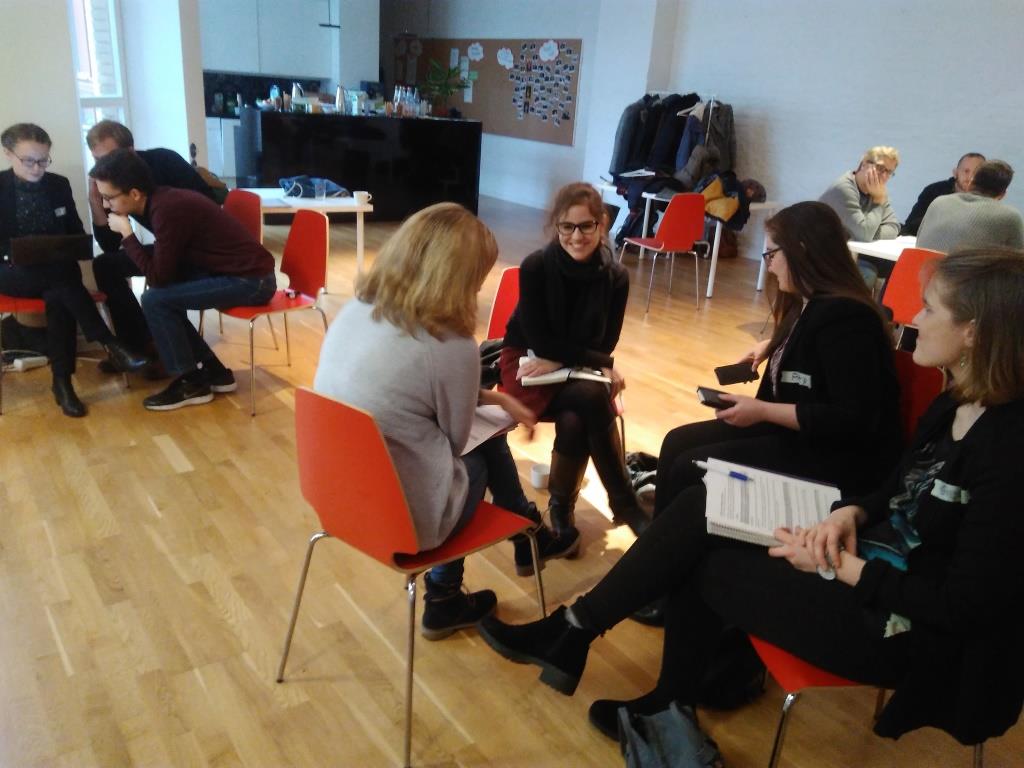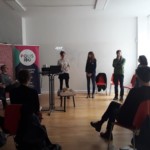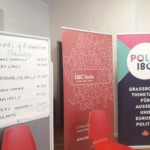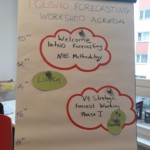Strategic Forecasting Workshop
Is forecasting in international politics possible at all and, if so, what do we need it for?
Polis180 Strategic Forecasting Workshop on the future of Visegrád Four cooperation
Combining a comprehensive and ambitious forecasting method and an unsteady and multifaceted state alliance whose cooperation perspectives look a loose cannon – sounds like the perfect way to spend a weekend in political Berlin, doesn’t it? One essential component needed to be added to the equation: fifteen young foreign policy, EU policy and Central and Eastern Europe (CEE) experts, graduate students and PhD candidates interested in putting their expertise to the proof and develop a sound forecast on a thrilling topic with a pinch of clairvoyant skills. Last but not least, the workshop participants had the opportunity to get to know or engage further with the vivid Polis180 community of policy enthusiasts. The innovative strategic forecasting workshop took place at the premises of our partners from the international alumni centre (iac).
The Forecasting Method: Over the course of two days the participants got to know the strategic forecasting method and experience it first-hand for a Visegrád Four (V4) forecast. Starting with the question whether forecasting in the murky waters of international politics is possible at all, organisers and participants discussed the scientific and political relevance of different future-oriented approaches. We fought our way through probability and uncertainty, biases and decision errors.
The approach, presented by the skilful moderators and unanimously chosen by the participants, was an adaptation of state-of-the-art National Intelligence Estimates (NIE) methodology, according to the U.S. national defence expert Richard Best “[t]he Intelligence Community Most Authoritative Product”. The process is designed to avoid vague discussions and group thinking through analytical thinking methods and structured debate. We did our best to apply it rigorously and have in mind the lessons learnt through the constant improvement of the methodology, inter alia confront different assessments and describe them, use estimative language and levels of confidence, introduce and iterate procedures with insiders and outsiders.
The Case: Why did we choose the Visegrád Four? Policy-related considerations on Germany’s bilateral relations with the CEE countries and/or the prospects for further EU integration and vital research interest be it with a political science, economics or sociology background went hand in hand.
Back in 1991, the Czech Republic, Hungary, Poland and Slovakia – united by common geographical, historical and cultural trajectories, on the one hand, and by their pursuit of (re)integration into the European home on the other – founded a loose and multifaceted Visegrád Group alliance. The Visegrád Four refers to the efforts of these countries to cooperate in a number of fields of common interest within their all-European integration. Initially, they helped each other to overcome their totalitarian pasts and introduce the cornerstones for functioning market economies. More recently, they embraced the digital revolution and Industry 4.0. In doing so, the Visegrád Group has been a success story. Yet, despite these prerequisites for further EU integration, the agenda of the Visegrád Four has changed, induced by a variety of factors on a national, European and global level, including the financial and economic crisis as well as recent migration of people searching refuge in Western Europe.
The varying degree of cooperation between the Visegrád Four in different policy areas is striking. While the economies are growing and prospering in the European Single Market, support for the EU agenda in other policy areas is fading. In June 2017, for instance, the EU launched an infringement procedure against the Czech Republic, Hungary and Poland for their lack of commitment to refugee allocation quotas. Considerations about a possible common EU sanctions policy against Poland’s judiciary reform eliminating checks and balances are on the top of the political agenda of the Union. The Central European states used to facilitate the Europeanization process while still considering their “national peculiarities”. Where are the V4 countries heading to now? Should we anticipate more or less cooperation outside of the EU framework? By organizing a strategic forecasting workshop, Polis180 aims to explore the new horizons of region-centred cooperation in Central Europe and assess the V4 prospects of EU commitment.
As a next step, the participants had to develop an analytical measurable question against the backdrop of the method’s requirements and their research focus regarding the future of the V4. After a multifaceted and quite heated discussion the die was cast, the majority chose to look further at the likeliness of a V4 country to lose its voting right due to triggering Article 7 (TEU) during the next five years. The forecasting enthusiasts identified key drivers impacting the answer to the analytical question as well as levels of probabilityand confidences connected to every single factor. Through zooming in and out omitted variables and biases took a more prominent place in the analysis than by other forecasting approaches presented in the beginning of the workshop.
The Feedback: Enabling a view into the forecasting black box, the organisers invited two distinguished experts on the V4 from the German and the European Council on Foreign Relations for a final reality check. While the ambitious method had been applauded, the foreign policy experts put an emphasis on the legal considerations which were lacking in the key drivers’ sections as well as the importance of the national politics dimension and the diversity among the V4 – the difference between the Hungarian and Polish political agenda stood out. Following questions ranked high as take-aways for the CEE and forecasting enthusiasts: How likely is the lack of trust in the EU to have an impact on the role of policy-makers and policy-takers especially among the so called “new” member states? How likely is the application of EU instruments addressing non-compliance by member states ranging from naming and shaming and economic sanctions to stripping of voting rights?
At the end of the workshop we left with more questions in the room than we brought with us. But the workshop has equipped us with a new tool box to tackle them. Stay tuned for more forecasting exercises with Polis180!
The organising team:
Over the past years, Alexander Sacharow worked on different foreign policy forecasting approaches, in particular forecasting tournaments and strategic forecasting. Aside from forecasting, his focus is on Eastern Europe and economic policy.
He recently graduated in public policy as well as economics and philosophy and joined Polis180 in 2016.
Oleksandra Kryshtapovych managed international and interactive projects in private sector and at the university in Ukraine, Sweden and Germany.
With background in international relations and global governance, she researches civil society and state relations in hybrid regimes at the Free University of Berlin. She joined Polis180 in 2017.
Petya Hristova is active in Polis180 East-West Relations Programme. After obtaining her Master’s in East European Studies focusing on the politics-economics nexus and the CEE’s integration in the international financial markets, she is now working as a Project Manager at the Committee on Eastern European Economic Relations in Berlin.



